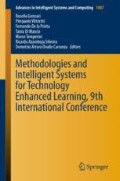Abstract
Artificial intelligence and especially Multi-Agent systems play a very important role within the technologies that have been applied to improve learning since they seek for the personalization and automation of this process. The literature reports important works, most of them focused on the instructional process or addressed to the virtual educational resource delivery. However, as a reflection of the traditional education situation, the assessment component and more specifically the adaptive assessment have not been given the same relevance within the learning process. Based on the premise that learning assessment is a fundamental component, which seeks to provide feedback from learning outcomes, it is proposed an assessment system that adapts to the specific conditions of each student. To do so, the system is able to recognize the academic differences and the learning style of the apprentices by modeling through a Multi-Agent System. In addition, this approach takes benefit from the great distribution advantages granted by this artificial intelligence technique. The preliminary validation of the system shows the possibilities that are open by using this kind of approaches.
Access this chapter
Tax calculation will be finalised at checkout
Purchases are for personal use only
References
Gagne, R.M., Briggs, L.J., Wage, W.: Instructional Design. Rinehart and Winston Inc, New York (1988)
Salazar, O., Ovalle, D.A., de la Prieta, F.: Towards an adaptive and personalized assessment model based on ontologies, context and collaborative filtering. In: 15th International Conference on Distributed Computing and Artificial Intelligence, DCAI (2019)
Duque, N.: Modelo Adaptativo Multi-Agente para la Planificación y Ejecución de Cursos Virtuales Personalizados, Universidad Nacional de Colombia - Sede Medellín (2009)
Wang, T.H.: Developing web-based assessment strategies for facilitating junior high school students to perform self-regulated learning in an e-Learning environment. Comput. Educ. 57(2), 1801–1812 (2011)
Neill, J.: Performance Assessment in Online Learning, pp. 1–5 (2005)
Nacheva-Skopalik, L., Green, S.: Adaptable Personal E-Assessment. Int. J. Web-Based Learn. Teach. Technol. 7(4), 29–39 (2012)
Conrad, S., Clarke-Midura, J., Klopfer, E.: A framework for structuring learning assessment in a massively multiplayer online educational game: experiment centered design. Int. J. Game-Based Learn. 4(1), 37–59 (2014)
Nakatsuji, M., Fujiwara, Y.: Linked taxonomies to capture users’ subjective assessments of items to facilitate accurate collaborative filtering. Artif. Intell. 207, 52–68 (2014)
El Alami, M., Maroc, T., De Arriaga, F.: Fuzzy assessment for affective and cognitive computing in intelligent e-Learning systems. Int. J. Comput. Appl. 100(10), 40–46 (2014)
Chrysafiadi, K., Troussas, C., Virvou, M.: A framework for creating automated online adaptive tests using multiple-criteria decision analysis. In: Proceedings - 2018 IEEE International Conference on Systems, Man, and Cybernetics, SMC 2018 (2018)
Krouska, A., Troussas, C., Virvou, M.: Computerized adaptive assessment using accumulative learning activities based on revised bloom’s taxonomy. In: 12th Joint Conference on Knowledge-Based Software Engineering, JCKBSE 2018 (2019)
Salazar, O.M., Ovalle, D.A., Duque, N.D.: Evaluation of metrics-based performance of a ubiquitous e-learning multi-agent context-aware system, using ontologies|Evaluación del desempeño basado en métricas de un sistema pedagógico multi-agente, ubicuo sensible al contexto y apoyado en ontologías, Form. Univ., vol. 9, no. 3 (2016)
Latham, A., Crockett, K., McLean, D., Edmonds, B.: A conversational intelligent tutoring system to automatically predict learning styles. Comput. Educ. 59, 95–109 (2012)
Díaz, L.: Los Objetivos Educacionales: Criterios Claves para la Evaluación del Aprendizaje. Universidad de Puerto Rico, Río Piedras (1994)
Morrissette, J.: Modos de interacción como fundamento en la realización de una evaluación formativa no instrumentada. Estud. pedagógicos 41(2), 373–388 (2015)
Duque, N., Ovalle, D.: Artificial intelligence planning techniques for adaptive virtual course construction. Rev. DYNA 78, 70–78 (2011)
Duque-Mendéz, N., Tabares Morales, V., Vicari, R.: Learning Object Metadata Mapping with Learning Styles as a Strategy for Improving Usability of Educational Resource Repositories, Rev. Iberoam. Tecnol. del Aprendiz., 11(2), pp. 101–106 (2016)
Kudenko, D., Kazakov, D., Alonso, E. (ed.) Adaptive Agents and Multi-Agent Systems III. Adaptation and Multi-Agent Learning, vol. 4865 (2008)
Acknowledgments
The research was partially funded by the project “Fortalecimiento docente desde la alfabetización mediática Informacional y la CTel, como estrategia didáctico-pedagógica y soporte para la recuperación de la confianza del tejido social afectado por el conflicto” code SIGP 58950 of the program “Reconstrucción del tejido social en zonas de pos-conflicto en Colombia” whit code SIGP 57579 supported by Fondo Nacional de Financiamiento para la Ciencia, la Tecnología y la Innovación, Fondo Francisco José de Caldas whith contract 213-2018.
Author information
Authors and Affiliations
Corresponding author
Editor information
Editors and Affiliations
Rights and permissions
Copyright information
© 2020 Springer Nature Switzerland AG
About this paper
Cite this paper
Duque-Méndez, N.D., Tabares-Morales, V., Ovalle, D.A. (2020). Intelligent Agents System for Adaptive Assessment. In: Gennari, R., et al. Methodologies and Intelligent Systems for Technology Enhanced Learning, 9th International Conference. MIS4TEL 2019. Advances in Intelligent Systems and Computing, vol 1007 . Springer, Cham. https://doi.org/10.1007/978-3-030-23990-9_20
Download citation
DOI: https://doi.org/10.1007/978-3-030-23990-9_20
Published:
Publisher Name: Springer, Cham
Print ISBN: 978-3-030-23989-3
Online ISBN: 978-3-030-23990-9
eBook Packages: Intelligent Technologies and RoboticsIntelligent Technologies and Robotics (R0)

